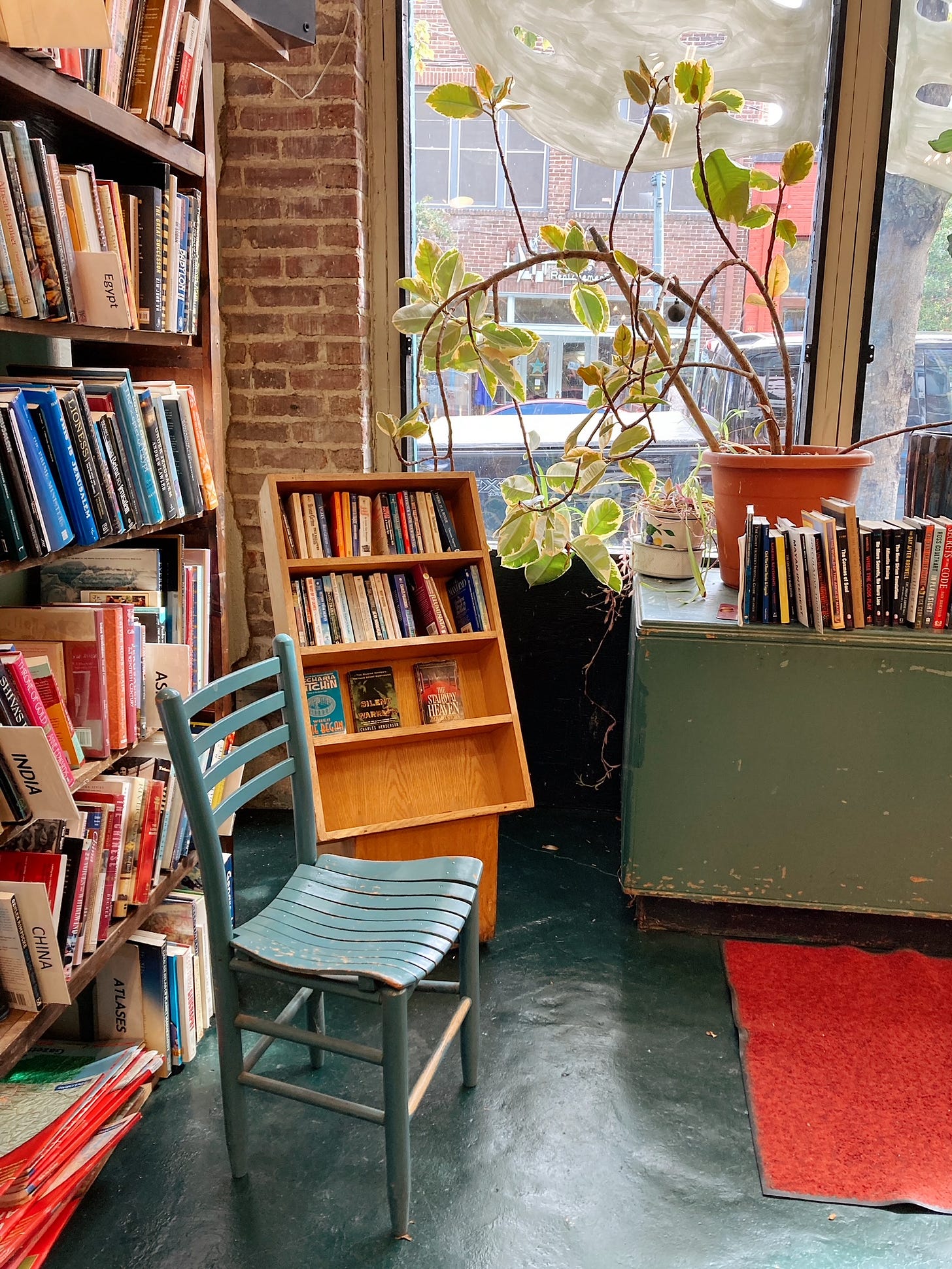LIVING
September always passes quickly. I recently found a journal entry from a few years ago that started with “did September only last four days???”, which is exactly how I feel right now. The weeks blur together, a reel of run clubs, concerts, Bible study nights, and lunches with my family. Aside from a long weekend in Asheville, I stayed in the Raleigh area the whole month.
Watching natural disasters hit your state is always devastating, but the damage from Helene in the North Carolina mountains is unlike anything I’ve seen before. It’s all anyone’s talked about this week; everyone knows someone who made it out or is trying to leave. Every business has a donation box, every local newsletter includes ways to give. Citizen Times posted a list of ways to help, if you’re so inclined.
READING
To celebrate the end of summer, I read Mary Oliver’s American Primitive, her Pulitzer Prize-winning poetry collection. I LOVED it. Sometimes I find nature poetry hard to connect to, but this collection is able to beautifully shape words around unnamed feelings. Reading this collection made me feel the same way I feel when listening to Ben Howard’s “Far Out” or Bon Iver’s “666” — restless, yearning.
In anticipation of Intermezzo’s release (I’m #78 in the library queue, so I’ll be waiting a while), I reread Sally Rooney’s previous releases. I read her first two this spring but took my time with Beautiful World, Where Are You, her story of two couples navigating the pitfalls of love and adulthood. This one more than the others captures the interior life of fellow millennials I know, the grasping for desire and meaning amidst an overwhelming and out-of-control world. I’ve seen people criticize the ending, as the characters are neatly paired up and optimistically looking toward the future, but I like concluding on a hopeful note.
My sc fi book club’s pick this month was Jumpnauts by Hao Jingfang. It’s terrible, like the author made it up as she went along and never went back to edit. Most of our meeting’s discussion parsed out why exactly it was awful: was it badly written or badly translated? Was it written for a Chinese audience so we’re missing cultural context, or was it poorly aimed at a worldwide audience? Several people felt like it was written to be a cartoon script but published as a novel. Whatever the reason for its significant flaws, I did not enjoy reading it and will never pick it up again.
Two rereads to round out the month. I’m continuing through Megan Whalen Turner’s Queen’s Thief series and read The Queen of Attolia, the second entry, where the political drama amps up. As with the first one, it was a delight to read again knowing the ending and seeing what hints Turner embeds in the dialogue. The second was Nella Larsen’s Passing, which I just read for the first time in June but jumped in again as part of
’s book club. The novel packs so much tension into 120 pages; reading the downward spiral of Irene and Clare’s friendship accompanied by the excellent commentary and comment section of Haley’s posts was a thrill. This might be one of my all time favorite books.ONGOING
I typically only share the books I’ve finished in these monthly round-ups, but that excludes most of my reading. I’m slowly working through some lengthier books:
I signed up for Dracula Daily earlier this year, a substack that sends out the contents of Bram Stoker’s Dracula in the form of a newsletter, with each day corresponding to the date in the story. The whole novel takes place between May and November, so I’m about a month from finishing. This is my third (or fourth?) time through Dracula; I love a slow burn, and reading it in daily chunks at the pace of the story has been fun.
Two Russian classics: I’m more than halfway through War and Peace by Leo Tolstoy (having a character guide is a game changer) and 2/3 of the way through Crime and Punishment by Fyodor Dostoevsky (weirder and more emotion-driven than I remember).
During my Asheville trip I started The Last Man by Mary Shelley, which I’d never heard of but picked up at a bookstore in Cape Cod last summer. One of the first dystopian novels ever written, the story follows a man during a pandemic that overtakes the world. I was anticipating a thriller, but the word “plague” isn’t even mentioned until page 179. I’m currently on page 245, halfway through the book, and the plague is still barely part of the story. I’m enjoying it but it’s not exactly a page turner.
Finally, I’m reading Stasiland: Stories From Behind the Berlin Wall by Anna Funder. I’m about halfway through and am fascinated by all the stories from her interviews and old Stasi files.


WATCHING
Started the month with two “weird” movies. The Lighthouse (Robert Eggers, USA/Canada, 2019) follows two 19th century lighthouse keepers, played by Willem Dafoe and Robert Pattinson, as they struggle to maintain their sanity and civility while marooned together on a remote island. Shot in black and white with an almost square aspect ratio, it feels old-timey and intimate. A gross, supernatural(?!), intriguing film. I love that Robert Pattinson isn’t afraid to pick weird roles. Eating Raoul (Paul Bartel, USA, 1982) is a comedy with a wild plot: to raise money for a down payment on their dream restaurant location, a prudish couple decides to pose as swingers and murder their clients for money. The ridiculous premise is played completely straight and has no right to be as entertaining as it is.
Three foreign films this month:
One of my local theaters had a showing of Stalker (Andrei Tarkovsky, Russia, 1979) on a Saturday morning, which I attended on the recommendation of my sci fi book club. It’s a long (too long?), slow (too slow?) film that follows three men — a “stalker” and his two clients — as they enter the Zone, which contains a room that fulfills your deepest desire. Most of the movie is taken up by the three men traveling to the Room and philosophizing along the way. I might have liked this better if I hadn’t just watched 2 or 3 Things I Know About Her, which also suffers from philosophizing. However, the lingering shots and beautiful visuals keep this one interesting.
The 400 Blows (François Truffaut, France, 1959), one of the defining films of the French New Wave, was my next watch. Fourteen-year-old Antoine, a misunderstood and oft criticized youth, devolves into a life of crime and is abandoned by his parents. Sometimes films about misbehaving youths lean into their spiteful natures, but Antoine feels like a child who just needed someone to pay attention to him.
I then watched the utterly charming, beautifully shot La Chimera (Alice Rohrwacher, Italy/France/Switzerland/Turkey, 2024), a film about grave robbers in 1980s Italy, headed by Josh O’Connor as a melancholy Brit with a gift for divining where tombs are hidden. I thought about the ending for a full day.
I haven’t decided how I feel about Paris, Texas (Wim Wenders, Germany/France, 1984), a movie about a drifter named Travis who’s been missing for four years and reconnects with his family. I enjoyed it up until the third act, when the conversations between Travis and his wife reveal what happened between the two of them and it is… not great! Enough to sour everything that came before! Beautifully shot and color graded though.
One stormy night I did a double-feature of I Married a Witch and Ella Enchanted. I Married a Witch (René Clair, USA, 1942) is short (77 minutes) and stars Veronica Lake as a witch hellbent on tormenting a politician whose ancestor had her burned, but falls in love with him instead. Light, fluffy, funny. Ella Enchanted (Tommy O’Haver, Ireland/UK/USA, 2004) is, to me, a perfect film. I can’t be objective about it; I saw it at the theater when I was 10-years-old and it is cemented in my brain as one of the great early 2000s rom coms. A 10/10 movie experience.
The only thing I saw this month that let me down was Challengers (Luca Guadagnino, USA/Italy, 2024). I was expecting a sexy movie about tennis and instead it was a hot mess of inexplicable character decisions, distracting music choices, and far too much slo mo. I enjoyed watching it only after I stopped trying to make sense of it.
ONGOING
I’ve spent the last month and a half watching the first half of Legion. Set in the Marvel universe (but better than, like, everything Marvel has made), the show follows David Haller, a mutant diagnosed with schizophrenia who figures out how to use his powers. I love a show that’s not afraid to get weird, and this show definitely gets weird.
And, the fourth seasons of both Only Murders in the Building and Slow Horses are currently running. Only Murders has gotten very silly, but I still enjoy watching the trio’s antics every week. Slow Horses continues to impress; good spies are out, fail spies are in.






I’m so glad you read Passing with us!! I am also enjoying the new Only Murders season (it is very over the top silly this season!) and was sad to read that Challengers wasn’t a hit. I’ve been wanting to see that one!